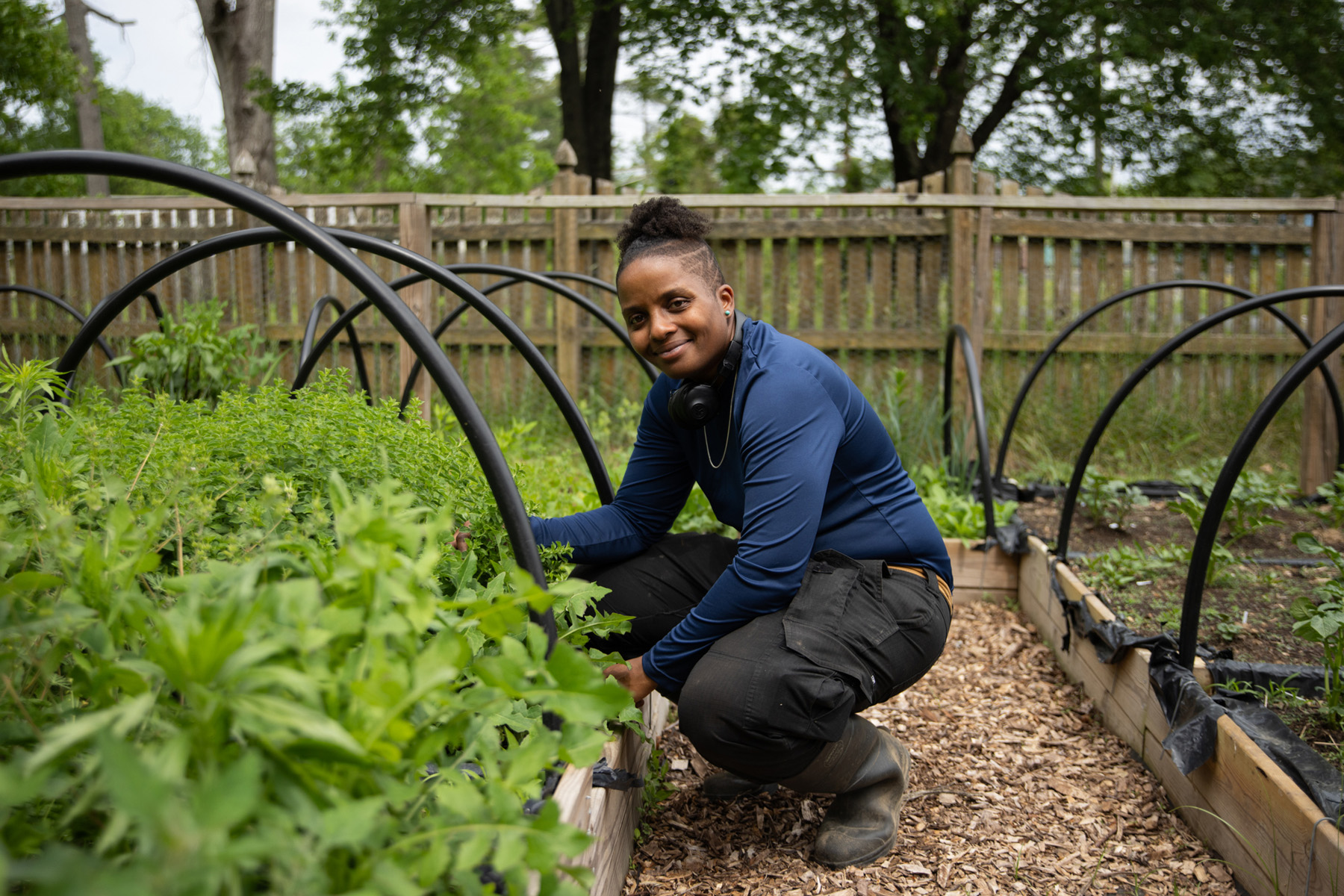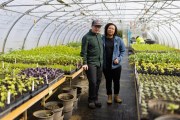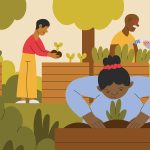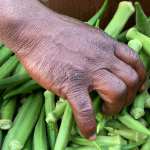BOWIE, Maryland — Growing up in Charles County, Maryland, Mel Thomas’ father sparked her interest in agriculture as he grew plants and food for the family.
“My dad and I, we would have a garden every year. I was an outdoor kid. I just wanted to be out there all the time. He taught me about growing,” she said.
What began as a childhood passion has blossomed into a way to foster community, encourage connection to the land and educate Maryland families about the importance of growing their own food.
Thomas, 38, is the owner and operator of Mel ‘n Nem Farms, stretching across half an acre about 20 miles outside of Washington, D.C., she and her team have developed a sustainable learning farm that offers workshops and training so that people of all age groups can be introduced to the basics of farming.
Near the entrance of the farm lies a memorial garden honoring Thomas’ father.
Mel ‘n Nem Farms has roots in both Thomas’ fond memories of gardening with her father and in the pandemic. When COVID-19 struck in 2020, Thomas recognized a rise in food insecurity for families in Maryland.
-
Read Next:
“There are so many places in Prince George’s County that are already food deserts, and with the food supply shortages and things like that from the pandemic, kids were starving,” Thomas said.
According to a 2024 report by the Capital Area Food Bank, 50 percent of Prince George’s County residents are experiencing food insecurity, a 5 percent increase from the previous year.
Mel ‘n Nem Farms works with the Bowie Interfaith Pantry and Emergency Fund to donate excess produce from their programming.
Thomas’ concern for Maryland families’ limited access to food highlighted another issue: Many Black and Brown families in her community didn’t have the access to agriculture that she did.
“I noticed that a lot of Black and Brown people didn’t have the skills to grow their own foods,” she said. “That was troubling to me because everything about American agriculture as it’s been built comes from Black and indigenous agricultural practices.”
The U.S. Department of Agriculture reported 32,700 farms owned by Black farmers in 2022, making up 5.3 million acres across the United States. That’s down from nearly a million Black-owned farms in 1920. According to the Black Farmers Index, an organization dedicated to Black agricultural research and food insecurity, just over 400 farms are owned by Black women.
Black and Brown representation in farming and access to agricultural learning — particularly for low-income people — played a part in Thomas’ desire to create educational spaces.
“The people who are getting millions of views on YouTube and having these channels don’t look like us. The permaculture classes that you can take are thousands of dollars just to teach practices that people have been doing for years,” she said.
“I’m not attached to a product, I’m attached to a solution.”
For Thomas, the solution was clear. In order to enhance her community’s understanding of farming, she needed to bring it to them directly, ideally on a small, easily digestible scale.
Through Mel ‘n Nem’s farm workshops, participants can register for hands-on growing lessons tailored to their needs. With the Grow Easy Gardening course, individuals get an in-person step-by-step lesson on how to grow fruits and vegetables in their own backyards. If they’re interested in learning more about troubleshooting planting problems, clients can register for the Thriving Garden course, where beginners are guided through strategies to improve the health of their at-home farms. There are also lessons on Container Gardening for those who may not have access to backyard gardening.
Finding a home in the rural neighborhood of Old Town Bowie, Mel ‘n Nem Farms offers a large plot of rich soil and thriving greenery. Next to her father’s memorial garden lies a section of raised garden beds where visitors can learn growing basics. During a visit last month, small yellow flowers sprouting out of the beds indicated the beginning of what would be several plants and vegetables. Decorated with rows of soil, Thomas’ produce had not yet sprouted but was anticipated to come alive during the warmer months ahead. Thomas’ farm cat Buster also kindly greets visitors as they stroll past each row.
“My intention was to make this a place where people can learn how to grow their own food, people can see what small-scale growing is and community farming is in action, and where people can reconnect with nature,” Thomas said.
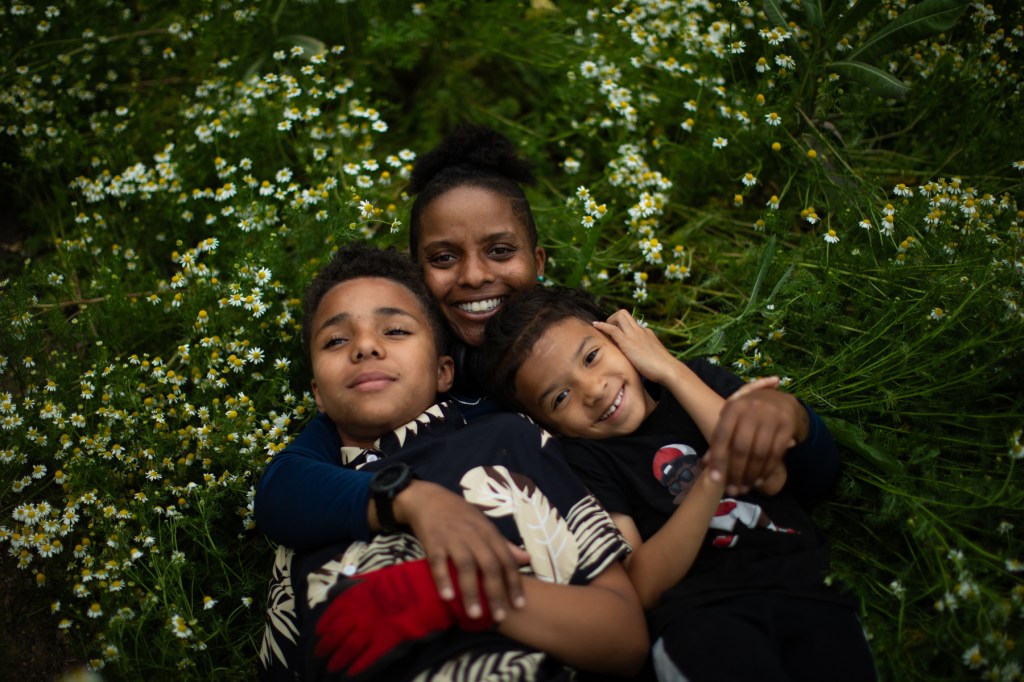
(Maansi Srivastava for The 19th News)
Mel ‘n Nem Farms also offers youth programming for educators and guardians who want to incorporate farming into their children’s learning. Open to students from pre-K to 12th grade, the programs offer the option of bringing classrooms to the farm or having the Mel ‘n Nem team come to them.
The value of bringing holistic farming practices to younger audiences is undeniable to Thomas. As a parent to two children, she finds that teaching youth about farming fosters independence and leadership while also educating them on where their food comes from.
“When you give kids autonomy and confidence and strong identity, they can do so many things,” Thomas said.
“Inevitably we are facing some incredible climate challenges, and having them understand the delicate balance of the ecosystem, of nature, of how they influence the ecosystem, and how they can use it for their own benefit, for their own sustenance. That, to me, is revolutionary.”
Through exposing her community to the historical contributions of Black and Brown people to agriculture, she aims to create opportunities for individuals who have experienced a disconnect from land.
While environmental factors like Black and Brown people’s migration to cities has contributed to people’s limited access to farming, she describes their painful history with land as relevant to this disconnect as well.
“The trauma associated with the land. Land stolen, land pilfered, forced to work. That’s something that I think on my end needs to be reframed. How do you reclaim something that belongs to you but has also caused you so much trauma?”
“To me, it’s joy. Let me just get you in the door with something you really love to grow,” Thomas said.
In bringing diversity and accessibility to farming, Mel ‘n Nem Farms is pushing to make it a local, readily available skill. For Thomas, it is about more than growing foods, it is about reconnecting with land and building greater solutions.
“To me, it’s their birthright. That’s something that they should have,” Thomas said.
